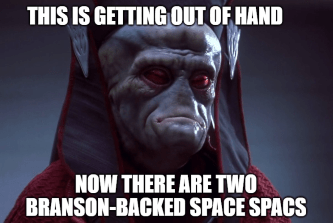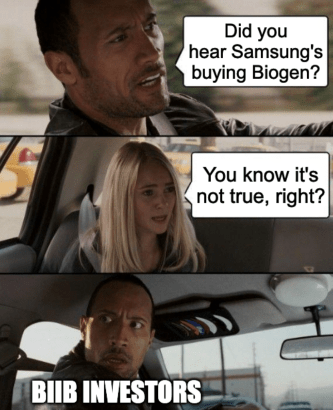
Thursday Throwdown: The “Odds & Ends” Edition
Congratulations, Great Ones! You made it.
We’ve officially sucked all the marrow of this here market like Mr. Keating (and Thoreau) would wish. We’ve almost carpe’d every diem, for this year at least…
But does the market madness have to end here? So soon?
Oh, nay nay! We searched all around for the last lingering stories of 2021 — the extra bit of pocket lint left after Wall Street high-tailed it for the holidays.
So Great Ones, I implore you … to set your sights high … to the skies!
I just see a drop ceiling that needs cleaning…
All right, a lil’ higher than that. Space! The final frontier and our last stop on 2021’s romp ‘round the financial universe. And with it … yet another space SPAC.
Thought you saw the last of those suckers? Think again: Virgin Group has yet another spacefaring salvo to sell the Street.
Not Virgin Galactic (Nasdaq: SPCE), mind you — we’re talking about Virgin Orbit (Nasdaq: VORB), which was spun off from the Virgin mothership in 2017 and went public today via a SPAC. Two different things. One has actually reached space … and the other is Virgin Galactic.
Longtime Great Ones will remember Virgin’s mistaken identity hoopla from almost exactly one year ago — the only other time we’ve ever mentioned Virgin Orbit — when SPCE investors confused Virgin Orbit’s space launch success with Virgin Galactic’s and preemptively sent the shares soaring.
While Virgin Galactic shoots up billionaires into the great big beyond, Virgin Orbit handles satellites. Virgin’s satellites go up, data comes down … plain and simple (don’t @ me, space geeks).

What Virgin Orbit doesn’t handle all that well, apparently, is SPAC mergers.
In sharp contrast to Virgin Galactic’s well-received interstellar SPAC launch a few years back, Virgin Orbit’s public market debut fizzled out like the dud firework no one dares to approach to relight.
The company raised less than half of the cash it expected to with its SPAC — $228 million in gross proceeds versus the $483 million Virgin talked up when announcing the merger.
It’s a tell-tale sign that hordes of investors redeemed their shares and got their money back on the deal … but Virgin insists that the SPAC was a victim of market conditions.
The SPAC’s funding shortfall was so bad, in fact — how bad was it?! — that Virgin Group added additional funding juice for the SPAC to meet its “minimum cash condition” and actually seal the deal.
Virgin Orbit needs all the sweet, sweet cash it can get for 2022’s ultra-packed launch schedule. Worse still, VORB shares crashed 8% on their debut and ended the day down 5%. Oof. You’d almost think the Branson bunch was trying to pawn off a Pinto…
Why Are Some People Laughing at Paul ?
Because he just made the most outrageous stock recommendation of his career.
But the last few times people thought Paul’s recommendations were “far-fetched,” those stocks shot up … 230% in 18 months … 570% in 49 months … and 905% in 33 months.
You be the judge. See the evidence here.
Sike, Still Stuck On Satellites

As Virgin’s slouching SPAC shows, the satellite shebang ain’t easy — especially considering all the space traffic that comes with launching up everyone’s orbital junk. (Phrasing?)
Aww, man. Nobody told me there’d be space traffic!
Hey, whoever controls the satellites controls the flow of the space spice, as they say.
And while the European Space Agency is already worrying about SpaceX’s growing “dominance of the space economy,” the SpaceX/Starlink chief is here to channel his inner Bill Nye and relieve all fears.
As Elon says: “Space is just extremely enormous, and satellites are very tiny.”
Orbital overcrowding? No, no, that won’t be a problem at all… Sending up thousands of satellites, like Starlink plans to, would just be a matter of proper traffic management. Obviously.
Now, I can see where Musk is coming from here — I’m somewhat of a satellite safety specialist myself, don’t you know. You just wanna keep track of all that metal space junk floating around up there and make sure it doesn’t bump into any other stuff you shoot into orbit.
Simple, right? Well, about that…
I might’ve at least chuckled at Musk’s “space is just too big, bro” non-explanation about orbital overcrowding … had SpaceX’s satellites not almost crashed into China’s space station this year. Twice.
So, at this point, I can only give Elon an award for the least-creative excuses.
The problem here isn’t just SpaceX … it’s Elon Musk. It’s always been Elon. The European Space Agency head is sounding the alarm — billionaires are controlling the commercial economy! Who’d a guessed?
One Of These Things Is Not Like The Other

They say opposites attract, but when it comes to the supposed buyout between electronics emperor Samsung and biotech beaut Biogen (Nasdaq: BIIB), one of these things just doesn’t belong.
In case you missed it, the rumor mill started roiling Wednesday afternoon when news broke that Samsung was in talks to acquire U.S. Alzheimer drug distributor Biogen. Because … somehow that pairing made sense to a few people on Wall Street.
Exactly how this tall tale got started in the first place remains to be seen … but it didn’t take long for Samsung to set the record straight. And for the record, Great Ones — Samsung is most definitely not buying Biogen.
Still, it paints a pretty portrait… For $28,000 a year, you too can reserve access to Biogen’s Aduhelm drug that may or may not treat Alzheimer’s in someone you love. And to help offset the cost, here’s a brand-spanking-new Samsung TV (a base model that retails for $499 before taxes).
Now if only you could find the remote that goes with it…
Flashpoint Fortunes: Like A Firework … It’s Lit!
Quant trading veteran Clint Lee set out to prove that Wall Street’s algorithms work in an entirely predictable way … if you know what to look for.
He found that right before they make their moves, they ignite “flashpoints” in the market that you can use to work out where they’re about to move their money — before they actually do it. And he created a new trading strategy geared around this idea, which currently boasts an astounding 84% win rate.
This special link here allows you to claim more than $2,500 off Clint Lee’s Flashpoint Fortunes VIP research service.
You still have time to get in … if you’re fast. This offer is only open until midnight Eastern time — tonight! Click here to learn more.

DIDI (NYSE: DIDI) isn’t DOA yet, Great Ones. But man, is China’s ride-hailing renegade barely limping along.
For one, DIDI just posted a $4.7 billion loss in its third quarter, which it blames on China’s regulatory tech sector crackdown. This latest earnings report confirms DIDI investors’ worst fears that government regulation might stop DIDI from drowning … but that it also severely limits the company’s ability to grow.
To make matters worse, China’s new regulations are forcing DIDI to delist from the New York Stock Exchange just months after it went public back in June. DIDI stock will soon trade on the Hong Kong exchange by way of a “listing by introduction,” which basically means that no new shares will be offered to raise money before DIDI delists.
Thing is, this would’ve been a bang-up way for DIDI to bank some cash while the Cyberspace Administration of China (CAC) conducts its investigation — especially since the CAC demanded that DIDI remove its software from mobile app stores until further notice.
Still, DIDI investors have learned to take what they can get. Seeing as China could’ve shut DIDI down for good over user privacy concerns … however China defines them … what’s a mere 63% loss year-to-date?
No wonder DIDI stock is having a rare up day: Shares soared 6% higher following today’s tepid earnings announcement. Don’t get too crazy there, DIDI — China won’t like that.

Jetsetter JetBlue (Nasdaq: JBLU) continues to cancel flights as the country’s COVID-19 cases spiral out of control.
More than 1,280 flights and counting have been grounded between today and mid-January … though travelers can probably expect more delays in the days to come.
Mind you, fudging flights is just JetBlue’s way of “getting ahead of Omicron” since the airline expects crewmembers to start calling in any day now and saying they have the virus. That’s putting the contagion-carrying cart a little before the horse if you ask me, but you do you, JetBlue.
Now, to help hopeful travelers — not to mention its bottom line — JetBlue joined the chorus of airline carriers asking the CDC to cut its recommended isolation time from 10 to five days for people who’ve tested positive for COVID-19 but remain asymptomatic.
Never mind that one person’s five-day “inconvenience” could be another person’s hospitalization… Much easier to sweep that little factoid under the rug and hope nobody notices.
It’s a bold strategy, Cotton. But let’s see if it pays off for ‘em.
If you were totally bewildered, confuzzled and bamboozled by yesterday’s hydrogen coverage, fret no more: a quick clarification is in order.
Yesterday, when discussing FuelCell’s (Nasdaq: FCEL) floundering flop, we noted: “Now you can see why Plug Power is at the top of our hydrogen shortlist of duds to dodge — there are simply better investment opportunities out there for hydrogen energy bulls to buy into.”
Considering we’re talking about duds and not the very best in hydrogen brilliance … that should’ve read “FuelCell” instead of “Plug Power.” Mea culpa.
Shout out to Great One Todd H., whose eagle eyes let no Freudian slip-ups slip by! (Hey, where’s our reigning/reining flub-finder, Ken B.?)
If you yourself want to reach out and say howdy, by all means, write to us! GreatStuffToday@BanyanHill.com is where you can reach us best.
In the meantime, here’s where you can find our other junk — erm, I mean where you can check out some more Greatness:
- Get Stuff: Subscribe to Great Stuff right here!
- Our Socials: Facebook, Twitter and Instagram.
- Where We Live: GreatStuffToday.com.
- Our Inbox: GreatStuffToday@BanyanHill.com.
Until next time, stay Great!











